Carly Bergey
It’s called a missed miscarriage: You arrive, as I did, at the doctor for your first-ever pregnancy appointment, suffering from morning sickness and filled with joyful anticipation–only to learn that your body has not yet registered the death of your small embryo. Despite all of my doctor’s tinkering and double-checking, the ultrasound screen showed no movement. There was just the outline of a baby in me, quiet and still.
Hoping for a natural miscarriage, I told my coworkers what had happened, but asked that we not discuss it at work.
Day after day, I went to the Denver office where I worked as a speech pathologist, carrying my baby deep inside me, like a single stitch woven within fold after fold of tissue and blood.
I was asking my body to let the baby go. My body refused. So the waiting continued.
My sadness was mingled with still another grief: My dad was dying of terminal throat cancer in Arizona, and my husband and I planned to fly there to see him soon.
Each day, I walked with a darkness inside as I attended to each patient, eight in a row, until it was time to go home.
I realize now that I was acting as I felt a good mother would. In waiting, I was protecting that little baby in me, the size of a poppy seed, and giving it space, in its death, to pass. I was giving space to the rest of my future, too. I didn’t know if I would ever have children to be close with, as I was with my dad. So there was just space.
After two weeks, the strain started to wear on me. One Sunday night, my husband found me folded up on the tiny vanity in our bathroom, sitting in the dark.
“I don’t know if I’m capable of handling this much loss,” I whispered.
The next morning, I greeted my coworkers and finished with, “I can’t talk to any of you,” avoiding the eye contact that was too painful to bear. But in the waiting room, I greeted patient after patient as usual: “Hi! It’s nice to meet you, come on back!”
A few days later, I greeted Roger, a patient in his seventies who looked young for his age. He matched the firmness of my handshake, a litmus test I’d unconsciously absorbed from my father, and I instantly liked him. And he responded so kindly to the proud and energetic woman I present first to everyone that for a second I felt my guard drop.
I led him into my office, invited him to sit and asked him to tell me what had brought him there.
He was an internist, he told me–and as he described the hoarseness, breathlessness and vocal-cord dysfunction that were his chief complaint, his lifetime of clinical experience showed clearly in the thoroughly detailed account. To my surprise and pleasure, despite his impressive professional accomplishments, he interspersed his recital with comments like, “I’m so pleased to hear from an expert like you.” Being all of twenty-eight years old, I felt tremendously honored. And, fortunately, I had some expertise to offer him.
I began by sharing some basic information about the negative impact of throat-clearing, which can lead to the symptoms he described. As a speech pathologist, I often tally the amount of times a patient throat-clears within a session’s first ten minutes. For some, throat-clearing has become so unconscious that they’re surprised to hear that they’ve done so ten times in ten minutes. Roger, I noticed, had cleared his throat fifty-five times within the first ten minutes.
When I shared this, Roger was at first floored–and then exhilarated to have his problem diagnosed, to know that it was nothing serious and to learn that there were tools to address it.
For me, it was so satisfying to feel, once again, a strong sense of connection to a patient who needed help and whom I could empower and educate. Since my miscarriage was diagnosed, I hadn’t felt truly available to connect with my patients.
Yes, the therapeutic relationship is important for the patient, I thought, but it’s always important for me, too.
We looked at each other, smiling, then Roger shifted in his chair and cleared his throat.
“Oh, sorry! I just did it again,” he said. We both laughed.
He leaned forward, cocked his head and said gently, “I’m sorry, but I need to tell you that you are extraordinary. You are so extraordinary–and yet I need to ask, Are you…suffering?”
My eyes widened in shock. My mouth fell open, and I let out a moan.
“Yes,” I gasped, then began to cry in the way that I do, relying heavily on my stately nose to breathe in air that magically and instantly turns into big tears welling out of my eyes.
He let me cry for a minute. Then he said, “I don’t know why, but I feel I need to tell you that you have a mother’s heart. It’s so strong. Do you have children?”
Now I sobbed, even more loudly. Quickly, I covered my mouth and half turned away in my swivel chair.
“I…I…I’m pregnant, but the baby has died. Right now, the baby is just…inside me.”
He reached across the desk and grabbed my hands.
“Don’t squirm out from under this,” he said. “Let it do its work in you. You must endure this and grow. Just endure this and grow.”
Smiling, he patted my hand in a grandfatherly way.
“I have to say it again, I just feel that you are a mother,” he said gently. “You are a mother. You have a mother’s heart. I believe that you will bear children. You will.”
I felt heartened that someone could tell I was a mother. Something inside me was radiating this to the world, and Roger could read it as plain as day–just as I could hear his throat-clearing when he could not.
At the end of the session, we embraced, then Roger gave me his card and left. He lived out of state, and he must have used his new knowledge about throat-clearing to ease his symptoms, because I didn’t hear from him again.
Three years passed, and I needed to leave my job in order to relocate. Cleaning out my office, I found Roger’s card in a desk drawer. So much had happened since we’d met that I was almost surprised to remember that he was real.
I emailed him to say that my husband and I now had two children.
“You saw me when I was suffering, and yet you were over the moon that I taught you a strategy to stop throat-clearing,” I wrote. “Thank you for sharing that moment with me!”
Writing those words, and remembering his kindness, I was struck yet again by how powerfully we can help another person just by being ourselves.
About an hour later, Roger called my office. He told me that he had just read my email and had tears in his eyes as he remembered our encounter. We reminisced and laughed, and I cried again.
Nowadays, Roger and I stay in touch. He sends me essays about medicine, health and marriage, and I remind him not to clear his throat.
About the author:
Carly Bergey is a speech-language pathologist, singer and writer with specialty training in treating vocal-cord dysfunction, chronic cough and voice and swallowing disorders. “I have long used writing as a therapeutic tool in self-care, and I extend that to patients in a narrative medicine framework.” Her creative writing has appeared in Intima, Crossroads blog and The ASHA Leader and is forthcoming in CHEST. She co-directs the Lehigh Valley chapter of Threshold Choir, an organization dedicated to singing at the bedside of those in hospice care. She is currently writing a book and lives in Bethlehem, PA, with her husband and her two children.
Story editor:
Diane Guernsey

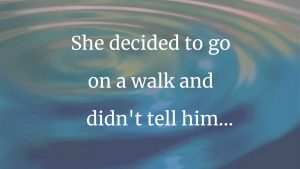

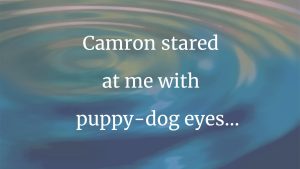
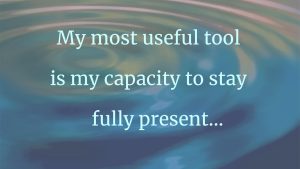
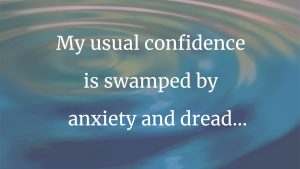
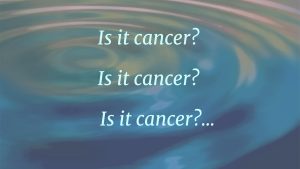
40 thoughts on “Unmasked”
This story is so moving. Connection between the medical provider and patient is important and then there is a second connection here, the magic of retelling and connecting with the reader. Thank you for sharing. I’m glad things turned out OK in the end for you.
Thanks for your comment. The connections with reader is a great point and am glad it connected with you.
Thank you, Carley, for this moving piece. “Unmasked” has resided on my screen since April. I wanted more. It led me to your Intima essay, “Frida Kahlo’s Portrait of Her Doctor and My Ofrenda…,” to Delbene & DasGupta’s Intima essay about Kahlo’s portrait & Dr. Farill, to the portrait itself. The end of this excursion was a NY Daily News photo of Frida Kahlo & Dr. Farill next to the portrait. Wonderful!
Along the way, I learned a new word—ofrenda—and about Kahlo. Your closing two sentences were powerful: “In my own office ofrenda I’m inviting myself to be present. I’m inviting the power of Frida to subtly change the dynamic from the giving of my expertise to a journey a patient and I share.”
The sentence in Delbene/DasGupta’s essay that grabbed me: “Here it is not the doctor who diagnoses the patient but rather, and as memoirist Anatole Broyard observes, the patient who diagnoses the doctor.”
That took me back to “Unmasked.” Thanks for the journey.
Thank you for your comment! I also wrote “Palpate” for Intima and love everything they publish! Frida Kahlo and her openness in suffering is such an inspiration. Glad you had a journey in learning about her and ofrendas.
Thank you for this. I cried too. My condolences for your sad loss, but am so glad you were able to give birth to two. May you be happy.
Thank you for reading!
Thank you for sharing this moving story.
Thank you for reading!
That is an empowering article. I cried too! Did I tell what a great kid you are today yet? You are you know. As your dad would have said. Live it up girl. From time to time I too remember him and our many good times. Smile
Thanks pal! What a sweet comment and so nice to hear from you!
Roger was an angel, who appeared right when you needed him! Thank you for sharing.
Thank you for reading!
A mother’s heart indeed!
You even looked after all of us readers – and so well:
I cried. And then I laughed
Thanks so much for sharing this – its so true that therapeutic relationships go both ways. I miss this so much since I had to retire as a clinician due to my own ill-health
I was moved by your story! Thank you for sharing.
Thank you for reading!
Hi Carly,
Wow, what a wonderful story! You are a very talented writer. I am your mom’s cousin in Minnesota. My daughter, Laura, is also a speech pathologist! I sure hope you two can meet someday. Thanks for sharing this lovely, moving tale.
Hi Kathy, thanks for reading!!
This was such a powerful essay; I had tears in my eyes when I read it. You are a wonderful writer. Thank you for your willingness to share your story with Pulse readers.
Thank you for reading!
A moving essay that is sweet, sorrowful and uplifting! So glad your mom posted on Facebook, otherwise, I would’ve never had the opportunity to read it. Thank you, Lady Carlyle!
Hi Kim,
Good to hear from you, xoxo!
Dear Carly,
Thank you for writing this story so beautifully. The connection both ways and the seeing of and into each other, is a story not often told. We need to remember that.
And love that you sing with the Threshold Choir. It was started close to us here by a friend.
Best wishes. MAM
Dear Carly,
Thank you for sharing your bittersweet story. I am so glad that your journey since then has been what you hoped for.
When our spirit is open, God / the Creator / the Universe / the Great Presence sends us what we need.
Thank you for reading, Ron.
I was so touched, Carly, by your story. You reminded me in a powerful way of the importance of the therapeutic relationship. I had that as an Epilepsy RN for 20 years. I still do even though I am retired now. I thought it left me in retirement but your story reminded me that as in you, the gift of connecting with people ( patients or otherwise ) and receiving the gift of connection back will never leave us.
Thanks Carly, for confirming…yet again for me…why connection and subsequent sharing is what makes us human and why we continue to go above and beyond our comfort zone time after time. Nice work, so proud! K
At the heart of your beautifully written story is the thoughtful and perceptive observation that your patient had the courage to make….he sensed your pain and distress and offered just the right words…how wonderful that you continue to be in touch.
You’re right, it takes courage to engage others when they are in pain. Thanknoybfor reading!
Carly, I’m a singer, former hospice medical director, and Lehigh Valley resident – this piece touched me in so many ways. Your writing is evocative and powerful. Thank you.
I would love to know more about the Threshold Singers.
Hi! I’d love to talk to you about Threshold! Email me atcthebergey@gmail.com thanks for reading!
Email bounced…
Cthebergey@gmail.com
What a sad yet lovely, life-affirming story about death really beautifully told. Thank you.
Thank you reading!
A very moving story. Thanks for sharing it.
Thank you for reading!
What an extraordinarily beautiful story. Thank you!
Thank you for reading
I am sobbing
Thank you so much for sharing your experience
Thank you for reading!